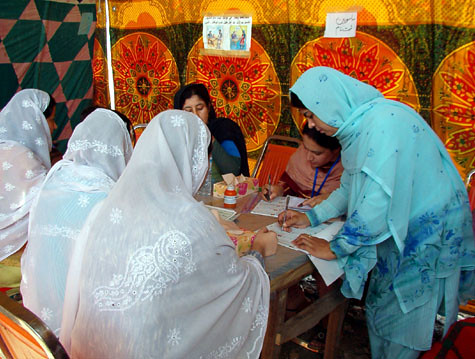After 18 years of war, $780 billion spent on combat, and $130 billion spent on reconstruction, the administration’s new stated goal in Afghanistan is “to achieve a peace agreement that ensures Afghan soil is never used again by terrorists against the United States, its allies, or any country and allows American troops to return home.” Negotiations for such a peace agreement are underway, with representatives from the United States government, the Afghan government, and the Taliban all attempting to bargain in the midst of what’s effectively a stalemate.
On January 28, the House Committee on Oversight and Reform’s Subcommittee on National Security held a hearing to examine the Trump administration’s Afghanistan strategy for these negotiations. The House Oversight Committee invited representatives from the Department of State and the Department of Defense, as well as the Special Inspector General for Afghanistan Reconstruction (SIGAR), John F. Sopko. Sopko was the only one of the three to attend.
“Women play a dispositive role in reducing conflict, advancing reconciliation, and ensuring that critical issues get addressed in negotiations.”https://t.co/0fcezBgQbg
— Afghan Women for Peace (@AfgWomen4Peace) September 4, 2019
Despite all of the political back-and-forth, I noticed that the women of Afghanistan were only mentioned when Rep. Carolyn Maloney (D-NY 12) pointedly asked Sopko about what the negotiations and reconstruction could mean for them. During decades of war from the 1970s to the 90s, and specifically under the Taliban regime from 1996 to 2001, Afghan women were banned from working, attending school, leaving the house without a male relative, being involved in politics, and showing bare skin in public. Violence against women, often as punishment for breaking these rules, was harsh.
However, I did attend the hearing; Sopko gave a statement on the oversight needed to ensure that reconstruction in Afghanistan is properly administered in order to reduce waste, abuse, and fraud. He was questioned by Chairman Stephen Lynch (D-MA 08) and Reps. Jody Hice (R-GA 10), Peter Welch (D-VT 00), Mark Green (R-TN 07), Robin Kelly (DA-IL 02), Thomas Massie (R-KY 04), Stacey Plaskett (D-VI 00) and Virginia Foxx (R-NC 05).
The status of Afghan women has improved exponentially since the collapse of the Taliban regime. The Afghan constitution, ratified in 2003, protects women’s rights. Afghan women now hold 63 out of 320 parliament seats. 1,150 women entrepreneurs have invested $77 million in new enterprises. 68,000 women are teachers; 10,000 women are doctors, nurses, and other healthcare professionals; 6,000 women are involved in Afghanistan’s military, police, and judicial systems. Yet despite these massive gains, the country still ranked 153rd of 160 countries for gender equality in 2018.
Rep. Maloney pointed out that, in discussions of reconstruction in Afghanistan, women have neither been included at the table nor have been a major point of policy concern on any negotiating side. Moreover, Afghan women do not trust the Taliban to keep its promises of respect and inclusion after reintegration of its fighters. Take the words of an Afghan prosecutor of violence against women, Zainab Fayez, who has been named a hero for women’s rights.
Rahima Jami, a member of the Afghan parliament, said that “Afghan women want peace too, but not at any cost.” I can’t help but agree with Rep. Maloney, Fayez, and Jami that Afghan women cannot simply be tossed to the side in all of this. To be clear, I’m not sure where I stand on the negotiations at all, let alone how the United States has waged the longest war in its history and doesn’t currently seem to have a coherent exit strategy. But I do believe the women of Afghanistan are afraid of what will happen if the men who have brutalized and oppressed them for years come back into power. As Sopko said during the hearing to Rep. Brenda Lawrence (D-MI 14), there are “no reassurances” that any peace deal will protect women, and that’s exactly the problem.
Without anyone advocating for them in the negotiations, who will ensure that the lives of Afghan women continue on the path of safety and upward mobility that began after the collapse of the Taliban? And, as Rep. Maloney asked, why shouldn’t women be at the table arguing for their own rights? The Afghan Women’s Network, representing 3,500 members and 125 women’s organizations from across the country, demanded to be included in negotiations when they first began two years ago; 750 women leaders did the same again in 2019.
They have proven what type of people they are, what their ideology is. And if they return with the same ideology, everything will be the same again.
Zainab Faye
But their calls for a seat at the table went unanswered.
In the peace deal announced on February 21, set to be signed officially on February 29, there’s no guarantee of the preservation of Afghan women’s rights. In the words of Gayle Tzemach Lemmon, an ABC journalist and author of the book The Dressmaker of Khair Khana about Afghan woman’s desire for freedom under the Taliban, “The question is whether peace will come on the backs of women.” Unfortunately, it seems that the answer is yes, jeopardizing years of progress for the women of Afghanistan and putting their futures at risk.
We should take this as a warning: when women aren’t at the table fighting for themselves, they’re on it as pawns to be nudged aside by players who deem their lives unworthy. Afghan women need to be in any further discussions after this peace agreement is officially signed, and their voices must be heard, loud and clear.
Featured image by The Advocacy Project / Creative Commons.

